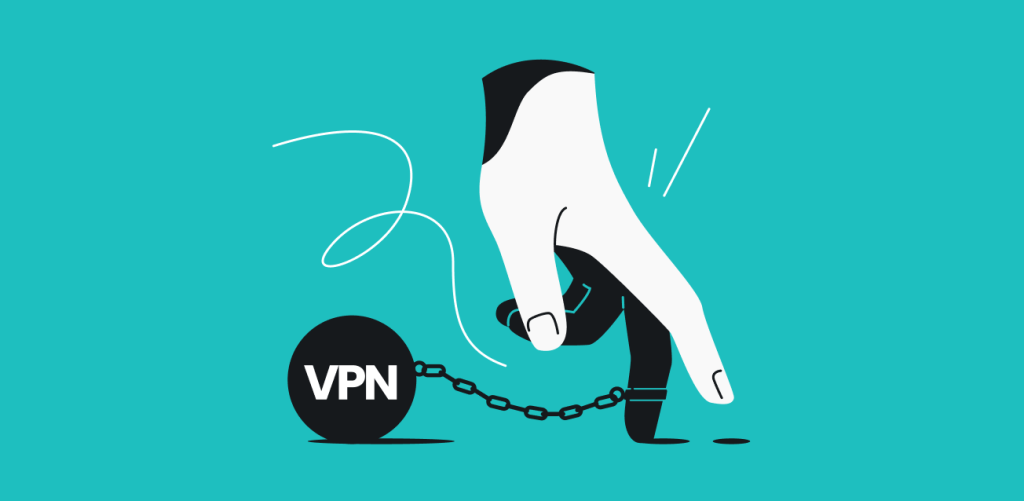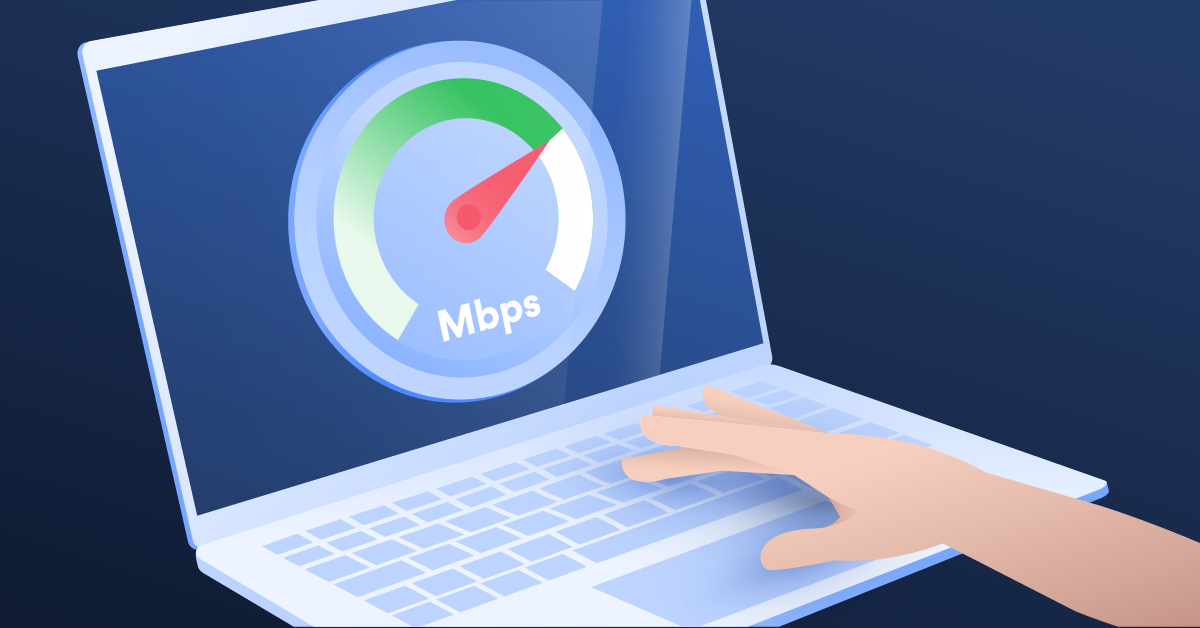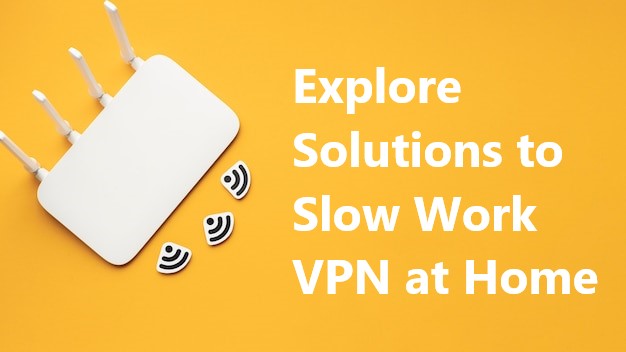Are you working from home, and suddenly your work VPN takes a nap? Well, Working from home seems convenient until you face rigid technical woes. A Virtual Private Network (VPN) sometimes leads to slow connections. This issue can be caused by various factors like the distance to the VPN server, server load, VPN protocol, or even your home internet connection.
Understanding these factors is essential to boost your VPN speed. This guide explores why you might be experiencing a work VPN slow at home and offers comprehensive solutions to improve your connection speed, allowing for a smoother and more productive remote working experience. Let’s get started!!
What is VPN and Its Functionality?

A Virtual Private Network (VPN) is designed to safeguard your online privacy and enhance security. It creates a secure tunnel between your device and the internet, encrypting your data and hiding your IP address. This technology allows you to access content restricted to specific regions and protect your online activity from prying eyes. Here’s our guide about types of VPN you can check it for more information.
Why Work VPN Slow at Home?
VPNs are commonly used by individuals and organizations alike to protect sensitive data and maintain a secure connection while working remotely. However, you may experience work VPN slow at home or slow internet speeds when using a VPN at home. This slowdown can result from server distance, bandwidth throttling, encryption overhead, or even issues with your home internet connection. To understand the factors influencing this, let’s dive into the possible causes and potential solutions. You can use other data transmission methods as an alternative to it.
1. Internet Connection and VPN Speed
You may notice a slow work VPN at home when using a VPN for work from home. Well, work-from needs high-end remote assistance. You can check our guide for remote assistance. This can result in slow loading times and difficulties connecting to work resources.
Solutions
- Running speed tests to check how fast your connection is without the VPN can help determine if your internet speed contributes to the issue.
- It’s also helpful to try different connections, such as a wired Ethernet connection or 5GHz WiFi, to see if it improves the speed of your VPN.
2. Hardware Limitations and VPN Performance
When using a VPN for work at home, it’s essential to consider the impact of hardware limitations on your connection speed. Some factors contributing to work VPN slow at home can be related to your home devices or network equipment.
Solutions
- Firstly, ensuring that your computer or device has the necessary resources to handle the VPN connection is essential.
- Older devices with limited processing power and memory might struggle to establish and maintain a stable VPN connection.
- Updating your device to keep it running efficiently and regularly is a good idea.

3. Outdated Router
Your home router also plays a crucial role in VPN performance. Standard home routers might not offer sufficient speed and stability when supporting a VPN connection, especially if multiple devices are connected to the network.
Solution
- It’s worth considering an upgrade to a higher-quality router designed to handle VPN connections more efficiently.
4. Server Distance and Its Impact on VPN Speed
When using a VPN, the distance between you and the server you’re connected to can greatly impact your connection speed. The farther away the server is, the longer it takes for data to travel between you and the server. This results in increased latency, which can cause work VPN slow at home.
Solutions
- To solve this issue, you can try connecting to a different server location that is closer to you.
- To find the best server for your needs, consider the server’s capacity, user load, and connection quality. You can take idea from
- By being mindful of server distance and selecting a suitable location, you can minimize latency and enjoy a faster and more stable VPN connection while working from home.
Ways to Improve Home VPN Speed

1. Server Selection
Choosing the right server can significantly improve your home VPN speed. Opt for servers that are geographically closer to you, as they usually offer lower latency and better connection speeds. Additionally, avoid connecting to highly congested servers. Instead, select servers with lower user traffic to reduce the likelihood of encountering performance issues.
2. Protocol Changes
Different VPN protocols can impact your connection speed. For instance, some protocols prioritize security over speed, while others strike a balance between the two. Consider switching to a protocol that offers a faster connection. For example, if you’re currently using the OpenVPN protocol, you might see improved performance by switching to the IKEv2 protocol or the lightweight WireGuard protocol.
3. Upgrading Hardware
Outdated or underpowered hardware can be a bottleneck in work VPN slow at home. If you use an older computer, router, or modem, upgrading to more powerful is the way to improve your speed. For example, consider upgrading your router to one with higher internet speeds and VPN acceleration features.
VPN and its Security Protocols

When using a VPN, your data passes through an encrypted tunnel, enhancing security. However, encryption can also affect the speed of your connection. You can check the Nord VPN guide for extra information. The stronger the encryption, the slower your internet connection may become. For instance, AES-256 bit encryption may offer better security but can result in a slower data transfer rate. However, you can use a screen sharing app for secured data transmission.
Balancing Encryption and Speed:
- Use a VPN with adjustable encryption strength.
- Opt for a lower encryption level if your priority is speed and you don’t require high levels of security.
Frequently Asked Questions
Q1. Why is my work VPN slow from my home network?
Your work VPN might be slow from your home network due to various factors such as distance to the VPN server, server load, your internet connection quality, or the VPN protocol used. When you connect to a VPN, the data encryption process can also cause a drop in internet speeds.
Q2. How can I improve my VPN connection speed?
To improve your VPN connection speed, try these steps:
- Connect to a VPN server closer to your physical location.
- Check your internet connection and upgrade to a faster plan if necessary.
- Switch between different VPN protocols to find the one that delivers the best performance for your needs.
- Restart your modem, router, and devices to prevent connectivity issues.
- Use a wired connection instead of Wi-Fi, as this can provide more stable speeds.
Q3. What are the main causes of slow VPN performance?
Some of the main causes of slow VPN performance include:
- Distance to the VPN server: The longer the distance, the slower the connection speed.
- Server load and congestion: High traffic and many users connected to the same VPN server can lead to reduced performance.
- VPN protocol: Different protocols provide varying levels of security and speed. Choose the one that best fits your needs.
- Your home network: A slow or unstable internet connection can lead to poor VPN performance.
- Data encryption process: The process of encrypting and decrypting data can cause a drop in internet speeds.
Conclusion
In conclusion, it’s entirely possible that your work VPN could be the reason behind a slow internet connection at home. To combat work VPN slow at home, consider checking your base internet speed, selecting the suitable VPN protocol, and changing your VPN server location. Remember that maintaining a solid and secure remote work environment is crucial in today’s digital age. By addressing these factors, you can continue to work remotely while enjoying a fast and reliable internet connection.



